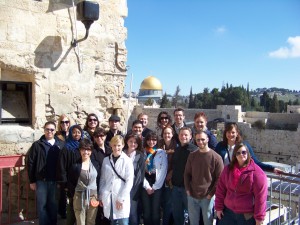 Over spring break, Dispute Resolution Program Coordinator Natalie Fleury and I were privileged to take 20 Marquette students to Israel as part of their class on International Dispute Resolution. We were joined on the trip by 10 students from Arizona State University’s law school and our colleague Art Hinshaw. The trip was an amazing experience with a mix of law, dispute resolution, and important religious and tourist sites. Before we went, short student papers and presentations focused on some the elements of the trip so that we would be better informed. The presentations included the Israeli legal system, the structure of the Palestinian Authority, history of the Middle East in the 20th century, the Druze religion, what a two state solution might look like, etc.
Over spring break, Dispute Resolution Program Coordinator Natalie Fleury and I were privileged to take 20 Marquette students to Israel as part of their class on International Dispute Resolution. We were joined on the trip by 10 students from Arizona State University’s law school and our colleague Art Hinshaw. The trip was an amazing experience with a mix of law, dispute resolution, and important religious and tourist sites. Before we went, short student papers and presentations focused on some the elements of the trip so that we would be better informed. The presentations included the Israeli legal system, the structure of the Palestinian Authority, history of the Middle East in the 20th century, the Druze religion, what a two state solution might look like, etc.
We traveled to Jerusalem, the Galilee (where we slept at a kibbutz right on the Sea), Safed, Nazareth, the Golan Heights, Haifa, and Tel Aviv. In addition to visiting important religious sites along the way, our itinerary included tours of the Supreme Court and the Knesset, visits to Haifa, Bar-Ilan, and Tel Aviv University law schools, meetings with co-existence groups like the Parent’s Circle (a group of bereaved families from both sides) and Ir Amim (an NGO working on Israeli and Palestinians equality in Jerusalem), a briefing from the legal advisor to the Northern Command of the Israel Defense Forces, meetings with practicing attorneys, a meeting in Nazareth with a lawyer from the Arab Center for Law and Policy, and so on.
One clear highlight near the end of the trip included dinner at Aharon & Elika Barak’s home. You might recall that Justice Aharon Barak was our Hallows speaker this past fall. As former president (chief justice) of the Israeli Supreme Court, Aharon Barak is widely considered the “John Marshall” of Israeli law. His wife, Elika, just stepped down as Deputy Chief Judge of the Labor Court. Not only did they help coordinate the visit to the Israeli Supreme Court at the beginning of our trip, which included a meeting with the first Israeli Arab judge on the court, they provided a home-cooked meal in their backyard while discussing judicial activism and the role of dispute resolution in the court system!
Over the next few days, I’ll be posting some of the student reflections from the trip. We are also hosting a public debriefing of the trip at the Law School this Monday, April 4th in Room 267. The entire community is invited.

